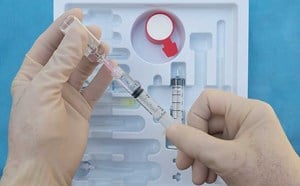
Use of Monoclonal Antibody to Treat COVID-19 in Children and Adolescents
In November 2020, the US Food and Drug Administration (FDA) provided Emergency Use Authorizations (EUA) for virus-neutralizing monoclonal antibody therapies for the treatment of mild to moderate COVID-19 in high-risk groups of adolescents 12-17 years and adults. Multiple studies have shown that this treatment significantly decreased the risk of subsequent emergency department (ED) visits and hospitalizations in adult patients over 18 years. It has become a game changer in the treatment of adult patients. With the first waves of the pandemic a relatively small proportion of COVID-19 infections occurred in pediatric patients, thereby limiting the experience with monoclonal antibody therapy in patients 12-17 years of age.
A press release was put out June 10th, 2021, by Children’s Hospital of Philadelphia (CHOP). They no longer recommend routine use of investigational monoclonal antibody products in children, adolescents, or young adults given the lack of pediatric safety and efficacy data. Further, children and adolescents with COVID are hospitalized at a significantly lower rate than older adults and the potential benefit of these therapies in younger age groups are unclear. If one of the nation’s top pediatric hospitals is publicly stating they are not recommending it due to a lack of evidence, how should we as EM and PEM physicians proceed?
I performed a literature search using both PubMed and Google Scholar and was only able to find a single article on the use of monoclonal antibody therapy in the pediatric population. The Journal of the Pediatric Infectious Disease Society published an article May 2021 titled “Initial Guidance on Use of Monoclonal Antibody Therapy for Treatment of Coronavirus Disease 2019 in Children and Adolescents.” A panel of pediatric experts from 29 institutions was convened to develop guidelines based on review of the best available evidence and expert opinion. The group found that there is no high-quality evidence supporting the safety and efficacy of monoclonal antibody therapy for treatment of mild to moderate COVID-19 in children and adolescents. They did find evidence for potential harm associated with infusion reactions or anaphylaxis.
The panel suggests against routine administration of monoclonal antibody therapy for treatment of COVID-19 in children or adolescents, including those designated by the FDA as at high risk of progression to hospitalization or severe disease.
There has been no evidence to refute this, and CHOP has been the only major children’s hospital to publicly release information on its institution’s use of monoclonal antibody therapy for COVID-19 in the pediatric population. The most recent NIH guidelines for COVID-19 therapy in children that was updated in April 2021 gave an AIII recommendation that most children with mild or moderate disease can be managed with supportive care alone. The recommendations reiterated that there is currently no data available to determine which high-risk pediatric patients defined in the EUAs will likely benefit from these therapies. Consequently, there is insufficient evidence for the NIH to recommend either for or against the use of these monoclonal antibodies in children and adolescents with mild to moderate COVID-19 who are at high risk of severe disease and/or hospitalization, and monoclonal antibody therapy should not be considered routine care. This recommendation is primarily based on the absence of data assessing efficacy or safety in children or adolescents, limited data with which to identify children at the highest risk of severe COVID-19, as well as the low overall risk of progression to serious disease in children, and the potential risk associated with infusion reactions.
Finally, there is limited published evidence on the co-administration of monoclonal antibody therapy with pediatric vaccines by interfering with the immune response. Monoclonal antibody– vaccine interaction studies are generally not required by regulatory authorities to support licensure indicating the lack of necessity or clinical relevance of such evaluations. This is reflected in FDA regulatory guidelines. According to guidelines, live viral vaccines should be administered at least three weeks before or three to eleven months after an injection of intravenous immunoglobulin depending on the dose. While specific studies investigating the co-administration of monoclonal antibodies with vaccines have not been performed, concerns could be raised. This means that the use of monoclonal antibody for COVID-19 in pediatric patients with chronic diseases could lead to a delay in vaccination, with a reduction in coverage for routine vaccines in the most fragile pediatric population. These concerns can have important implications in a historic moment such as this in which vaccination coverage has dropped significantly because parents skipped the vaccine appointment of their sons as they were afraid of COVID-19, or vaccination centers postponed the appointments because they were closed. On the other hand, COVID-19 vaccines could actually represent the best option for vulnerable children and adolescents because of their cost-effectiveness, and the use of monoclonal antibody for COVID-19 treatment could negatively affect the immune response to the COVID-19 vaccines.
The criteria currently used for monoclonal antibody therapy against SARS-CoV-2 are very broad and allows individual clinicians or institutions to use these agents on a case-by-case basis. Several questions need to be addressed before their routine use in pediatric clinical practice, including what their associated benefit-to-risk ratio in children and adolescents is, who are the patients that could really have benefit from their use, and if there is an interference with monoclonal antibody therapy on recommended vaccines. While we wait for answers to these questions from well-conducted research, an effective and safe COVID-19 vaccine for vulnerable pediatric patients remains the best strategy to prevent COVID-19 and represents the priority for public health.
Other than supportive care, therapeutic interventions for children and adolescents with mild to moderate COVID-19 are limited. Parents/caretakers will be concerned and scared when their child is diagnosed with COVID-19 and will want some therapeutic intervention. Many people have heard of monoclonal antibody therapy for COVID-19 and may ask about the option. With the limited data supporting use of monoclonal antibody therapy in children and adolescents, a serious discussion about the risks, benefits, and shared decision-making with the parents/caretakers may be the best path forward.
John Misdary, MD





